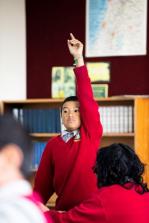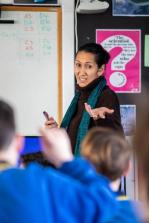You are here:
- Home »
- Teaching science »
- Teaching strategies »
- Practising disciplined enquiry
Practising disciplined enquiry
Children … will seldom be able to create genuinely new science knowledge, but they can gain a feel for disciplined enquiry.
When scientists investigate, they draw deeply on the full complexity of their current understandings of science. Children cannot be expected to do the same.
While they may seldom be able to create genuinely new science knowledge, they can gain a feel for disciplined enquiry.

Developing disciplined enquiry by students comes through the practice of:
- knowing what
- knowing when
- knowing how
- knowing where
- knowing why.
Focusing and planning
Knowing what
Knowing what is the focus of the investigative question. It makes clear what models to think about initially.
Make sure students know what to plan – what will they observe, measure, or count? What focus, range, or sample size do they need?
They should know what equipment is available for specific types of measurement or observations.
Knowing when
Students need to know when the question is in a form that can be investigated, when to use a fair test, and when to use a different type of investigation.
They should also understand when observations need to include systematic measurement.
Teach them that everyday meanings of words are not necessarily the same as those that scientists use.
Knowing how
An aspect of a focus and planning is knowing how:
- to turn a statement into a question
- to work out a way of answering a question
- to specify what could count as evidence in answering the question
- to turn a question or observed pattern into a prediction
- to identify and control variables (especially if the investigation is a fair test).
Knowing where
Be sure students know where to seek help in framing the investigative question or in setting up the investigation.
Knowing why
A great skill is knowing why people ask different questions about the same thing as it is useful skill in other disciplines or real-life situations.
Information gathering
Knowing what
Know what to observe (if this has not been specified in the plan) and what recording tools and recording formats to use.
Be familiar with words that describe the observations made (for example, specialist terms for properties or effects).
Knowing when
Know when enough observations, measurements, or counts have been taken to answer the question. Decide if you need to gather additional data to confirm a suspected pattern.
Knowing how
Knowing how to use measuring and counting equipment accurately is important. So is being able to recognise the endpoint (if a change is being observed) and to record data systematically (tables, and so on) so it is useable at a later date.
Knowing where
Knowing where to take samples is important. It is easy to overlooks this part in the process, so be sure to check that students know where the samples should end up.
Knowing why
Knowing why a sampling strategy might need to be changed is also important. You might want to do a brainstorm with the class – make a list of possible reasons why a sampling strategy would change.
Processing and interpreting
Knowing what
Students should understand what to do with the data, in order to look for any patterns (comparing, grouping, ranking, averaging). The should be aware that patterns could provide a defensible answer to the question or hypothesis.
The should be aware that models might help to explain the data gathered.
Knowing when
In processing and interpreting, knowing when things are going well or not-so-well is valuable.
Know when:
- an identifiable pattern is emerging from the data
- an unexpected complication has prevented the investigation from answering the question asked
- the question has been answered (or it is time to ask a new question)
- the data could be explained in different ways.
Knowing how

To be successful in processing and interpreting, students should know how to:
- carry out simple mathematical procedures (grouping, ranking, averaging)
- process data into appropriate graphical representations
- use experiences positively to begin again with modifications as needed
- determine if other findings are relevant or irrelevant to the question.
Knowing where
Find out if students know where to look for other people’s findings of relevance to the question.
Knowing why
Some findings might not show a pattern at all, or the investigation may not have yielded relevant information. Be sure students know why these situations might emerge.
Reporting
Knowing what
Students need to know what parts of the investigation are central to the report and what bits are peripheral details. Give them lots of practice to acquire this skill.
Knowing when
Make sure students know when to use scientific language rather than ‘"everyday" words. They should also learn how to know when the investigation is ready for reporting.
Knowing how
Teach your students scientific terminology in a way that leads to their being able to explain these in their own words. Students should also know how to modify the presentation of the findings to suit different audiences and purposes.
Knowing where
Go over with the class places where they might make findings available.
Knowing why
Students should know why one theory or model may be more convincing than others. Discuss with students why people might not believe or be convinced by their findings.

